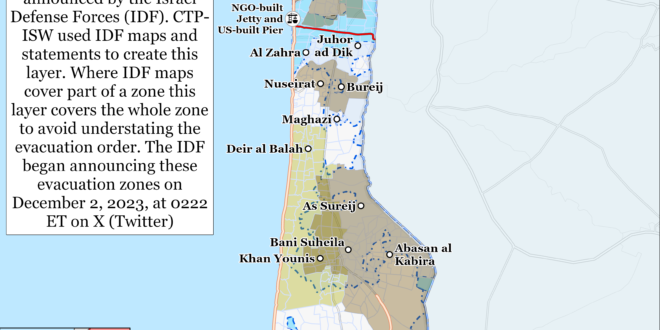Iranian reformist presidential candidate Masoud Pezeshkian appears to be gaining momentum ahead of the runoff presidential elections on July 2. Several recent polls demonstrate that Pezeshkian is maintaining his lead over hardline candidate Saeed Jalili.[i] Pezeshkian received 10.4 million votes and Jalili received around 9.5 million during the first round of elections on June 28.[ii] Former presidential candidate and pragmatic hardliner Mohammad Bagher Ghalibaf’s campaign head Sami Nazari Tarkarani also endorsed Pezeshkian on July 2.[iii] This endorsement may divert some of 3.4 million votes Ghalibaf received during the first round of elections to Pezeshkian, thus advantaging Pezeshkian.[iv] Pezeshkian also performed strongly in a July 1 economic debate against Jalili. Members of Jalili’s own faction criticized Jalili’s poor performance, in contrast.[v] Details on this debate are included in the following paragraphs.
Supreme Leader Ali Khamenei must determine if he will permit Pezeshkian to win the election if Pezeshkian maintains his lead over Jalili. Khamenei expressed foreign and nuclear policy views on June 25 that closely align with ultraconservative hardline presidential candidate Saeed Jalili’s views, suggesting that Khamenei endorses Jalili.[vi] Khamenei also indirectly criticized Pezeshkian’s campaign policies on the same date.[vii] This suggests that Khamenei may decide to prevent Pezeshkian from becoming president. Raisi’s 2021 election suggests that Khamenei is comfortable engineering elections to advantage his preferred candidate.[viii] The Guardian Council denied the candidacies of several prominent politicians in the 2021 elections and Raisi therefore faced no significant competition in the race.[ix]
It is unclear, however, how and if Khamenei will advantage Jalili if Pezeshkian is able to generate increased support and win the election this week. The regime engineered the election results between reformist Mir Hossein Mousavi and hardliner Mahmoud Ahmadinejad in 2009, galvanizing a months-long anti-regime protest wave.[x] Khamenei would risk further deteriorating regime legitimacy and possibly kickstarting unrest if Pezeshkian garners increased support in the coming days and Khamenei decides to undermine Pezeshkian’s ability to win the election.
The two remaining presidential candidates, reformist Masoud Pezeshkian and hardliner Saeed Jalili, discussed the economy in the first debate of the election’s second round on July 1.[xi] Both candidates reiterated previous economic talking points on their agenda from the first round.[xii]
Masoud Pezeshkian (reformist): Pezeshkian emphasized the importance of increased public participation in the economy, including by women and minority groups. Pezeshkian also emphasized the importance of high voter turnout rates for the final election on July 5. He probably calculates that a greater voter turnout will improve his chances at election.[xiii] Pezeshkian said that international sanctions cause Iran’s economic issues in part, but that the government’s failure to fully implement economic policy also contributes to Iran’s economic woes.[xiv] Pezeshkian said that improving the economy also requires pragmatism in diplomatic relations with the world, noting that Iran will ”never…cancel all sanctions” and that loosening sanctions depends on ”what we give [diplomatically] and what we get [diplomatically]“ and whether Iran wants to ”solve [its] problem with the world or not.”[xv] Pezeshkian also noted the value of strong management within government.
Saeed Jalili (ultraconservative hardliner): Jalili focused on how the next government can create more employment opportunities.[xvi] Jalili agreed with Pezeshkian that greater participation in the economy is better.[xvii] Jalili proposed finding alternative trade partners to alleviate sanctions’ impact on the Iranian economy.[xviii] This suggestion presumably means that China, Russia, and other US adversaries. Jalili did not suggest returning to nuclear negotiations as a way to improve the Iranian economy or relations with foreign countries.[xix] Jalili criticized Pezeshkian for placing too much of the blame on the Iranian government for the failure of JCPOA and not enough on the other parties involved.[xx]
A senior advisor to Iranian Supreme Leader Ali Khamenei is attempting to publicly discourage US support for a major Israeli military offensive into Lebanon. Strategic Foreign Relations Council Chairperson and Supreme Leader Foreign Affairs Advisor Kamal Kharrazi stressed Iran’s support for Hezbollah in the event of an Israeli military operation against Hezbollah in Lebanon during an interview with the Financial Times on July 2.[xxi] The fact that Kharrazi gave this interview to this outlet suggests his primary audience is the West, including the United States. Kharrazi said that Iran was “not interested” in participating in a regional war and stressed the need for the United States to discourage Israel from launching an operation against Hezbollah. Kharrazi noted that Iran and the Axis of Resistance would have “no choice” but to use “all means” to support Hezbollah in the event of an Israeli military offensive into southern Lebanon. Kharrazi’s comments follow statements from several Iranian officials boasting about Iran and the Axis of Resistance’s ability to destroy Israel in recent days. IRGC Air Force Brigadier General Amir Ali Hajizadeh warned that Iran is ”awaiting an opportunity for the True Promise II Operation” during a speech on July 1.[xxii] The first True Promise Operation was the Iranian drone and missile attack targeting Israel on April 13.[xxiii] Acting Iranian Foreign Affairs Minister Ali Bagheri Kani separately told Turkish Foreign Affairs Minister Hakan Fidan in a phone call on July 1 that Hezbollah is ”fully prepared” to resist any Israeli threats into Lebanon.”[xxiv]
Kharrazi separately reiterated in his interview with the Financial Times that Iran was open to pursuing nuclear weaponization if it faced ”an existential threat.” [xxv] Kharrazi made similar statements suggesting that Iran could pursue a nuclear weapon in May 2024.[xxvi] Kharrazi’s statements also coincide with normalized discussions about Iran’s ability to procure nuclear weapons among Iranian officials and evidence that Iran has expanded its nuclear program in recent weeks, suggesting a broader policy shift in Tehran.[xxvii]
Several current and former Israeli security officials told the New York Times that top Israeli generals disagree with political establishment’s war goals in the Gaza Strip.[xxviii] Unspecified Israeli generals reportedly think a ceasefire is the best way to ensure the release of living Israeli hostages from Hamas custody.[xxix] Former Israeli National Security Advisor Eyal Hulata corroborated this account, adding that high-level military officials believe a ceasefire would allow for the release of hostages and that the IDF could fight Hamas at some point in the future.[xxx] Hulata was the national security advisor until early 2023. Hamas has rejected ceasefire proposals that do not ensure a permanent ceasefire partly due to the possibility of the IDF fighting Hamas again after Hamas releases the hostages.[xxxi] IDF spokesperson Daniel Hagari implied on June 19 that the IDF thinks the Israeli prime minister’s goal of destroying Hamas is not an achievable goal and that those advocated the goal are ”misleading the Israeli people.”[xxxii] IDF clearing operations have successfully degraded Hamas battalions throughout Gaza Strip, but Hamas has reconstituted its forces in several areas after Israeli withdrawals, partly from newly recruited fighters.[xxxiii] The IDF explicitly responded to the New York Times report, reiterating that the IDF agrees with the Israeli political leaders’ goal to “destroy the military and governmental capabilities of Hamas” and return Israeli hostages.[xxxiv] Israeli Prime Minister Benjamin Netanyahu reiterated his stance that the war will end once Israel “achieves all of its objectives, including the destruction of Hamas and the release of all” the hostages.[xxxv] The reported disagreement between the Israeli civil-military establishment comes as the IDF is expected to shift from full division-sided clearing operations like it is currently pursuing in Rafah to a reduced but lasting force presence along the Philadelphi and Netzarim Corridors.[xxxvi] Prime Minister Netanyahu said on July 1 that the IDF was advancing to the ”end of the stage of eliminating Hamas” militarily.[xxxvii]
Key Takeaways:
- Iran: Iranian reformist presidential candidate Masoud Pezeshkian appears to be gaining momentum ahead of the runoff presidential elections on July 2. Supreme Leader Ali Khamenei must determine if he will permit Pezeshkian to win the election if Pezeshkian maintains his lead over Jalili. Khamenei would risk further deteriorating regime legitimacy and possibly kickstarting unrest if Pezeshkian garners increased support in the coming days and Khamenei decides to undermine Pezeshkian’s ability to win the election.
- Lebanon: A senior advisor to Iranian Supreme Leader Ali Khamenei is attempting to publicly discourage US support for a major Israeli military offensive into Lebanon.
- Gaza Strip: Several current and former Israeli security officials told the New York Times that top Israeli generals disagree with the political establishment’s war goals in the Gaza Strip. IDF spokesperson Daniel Hagari implied on June 19 that the IDF thinks the Israeli prime minister’s goal of destroying Hamas is not an achievable goal and that those who advocated the goal are ”misleading the Israeli people.”
- Yemen: The Houthis claimed on July 1 that it conducted four ballistic and cruise missile attacks targeting four commercial vessels in the Red Sea, Mediterranean Sea, Arabian Sea, and Indian Ocean. CTP-ISW cannot verify that these attacks occurred.
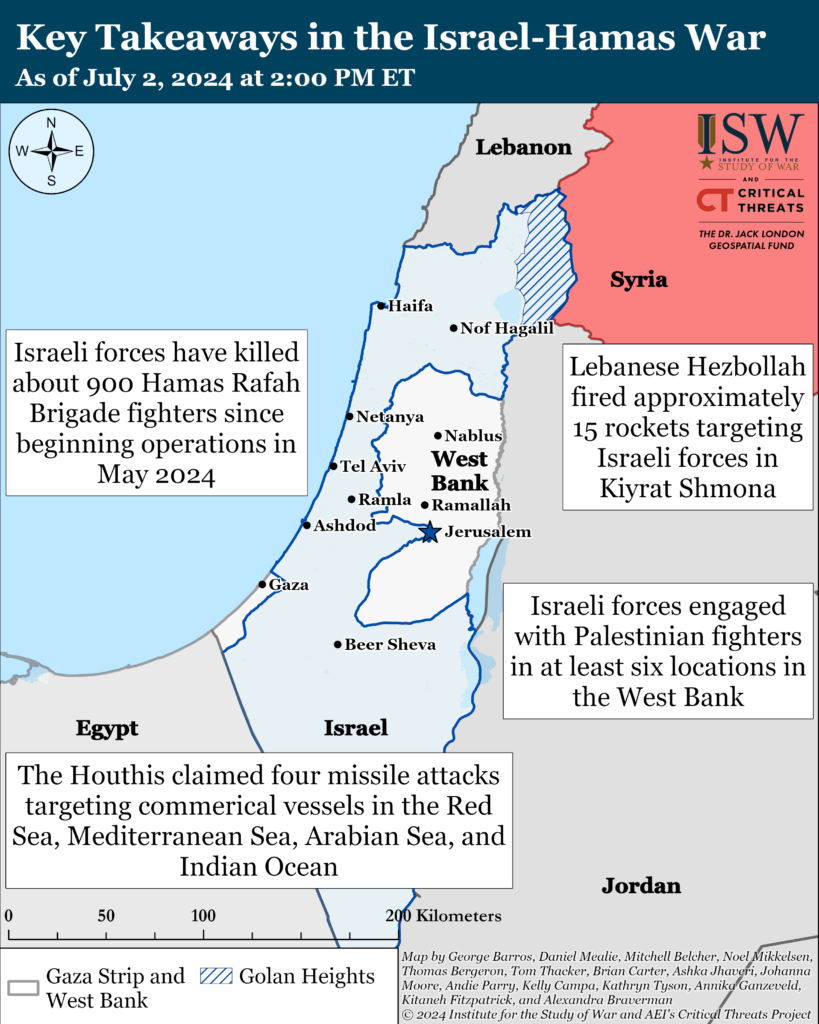
Gaza Strip
Axis of Resistance objectives:
Erode the will of the Israeli political establishment and public to sustain clearing operations in the Gaza Strip
Reestablish Hamas as the governing authority in the Gaza Strip
The IDF 98th Division continued operations to degrade a partially reconstituted Hamas battalion in Shujaiya, Gaza City on July 1. IDF 7th Brigade seized small arms, bulletproof vests, and other military equipment from buildings in Shujaiya.[xxxviii] The IDF Air Force struck militia infrastructure including tunnel shafts, ammunition depots, and an anti-tank missile firing position.[xxxix] Israeli strikes also targeted Palestinian fighters in the neighborhood.[xl] Hamas and Palestinian Islamic Jihad (PIJ) targeted Israeli forces in Shujaiya in a combined complex and multi-stage attack on July 2.[xli] Hamas and PIJ fighters first ambushed Israeli infantry in a building with a thermobaric rocket. The fighters then targeted the Israeli quick reaction force with an explosively formed penetrator, rocket-propelled grenades, and additional thermobaric rockets.[xlii] Hamas claimed that the combined attack killed several Israeli soldiers.[xliii] The use of sophisticated weapons and tactics indicates that Hamas‘ Shujaiya Battalion has at least partially reconstituted since the IDF last operated in the area in April 2024.[xliv] Palestinian fighters conducted at least nine other attacks targeting Israeli forces in Shujaiya.[xlv]
The IDF is reportedly expanding the width of the Netzarim Corridor south of Gaza City from two to four kilometers.[xlvi] Commercially available satellite imagery shows that Israeli armor has operated both north and south of the corridor’s current two-kilometer width. The expansion of Israeli clearing near the corridor indicates that the buffer may extend from Wadi Gaza in the south to Road 10, which is south of Gaza City, in the north. The IDF originally demolished structures in one kilometer north and south of the main highway in the Netzarim Corridor when it established the corridor in February 2024. [xlvii] An Israeli security official said that the IDF is expanding the corridor because it increases pressure on Hamas and degrades militia infrastructure.[xlviii] IDF officials said that the repeated Israeli clearing reportedly angers Hamas fighters and enables the IDF to keep Palestinians who have fled south from re-entering the northern Gaza Strip.[xlix] The IDF technology and logistics department is also upgrading infrastructure and protection for Israeli forces along the corridor.[l] Israeli sources have indicated that the IDF is close to transitioning to a third phase of operations in the Gaza Strip that would require Israeli forces to hold the Netzarim and Philadelphi corridors to launch limited short-term raids into the Gaza Strip.[li] The expansion and upgrades to the Netzarim Corridor will enable the IDF to more effectively implement its reduced force presence and raid plan.
The IDF 99th Division continued operations along the Netzarim Corridor south of Gaza City on July 2.[lii] Israeli forces engaged Palestinian fighters at close range and seized weapons and other military equipment near the corridor.[liii] Palestinian fighters fired rockets and mortars at an IDF headquarters along the corridor.[liv]
The IDF Air Force struck several militia sites in Khan Younis on July 2 after issuing evacuation orders to the area on July 1.[lv] The IDF targeted a weapons warehouse, operational apartments and other militia sites.[lvi] The IDF issued evacuation orders for eastern Khan Younis on July 1 after PIJ fired 20 rockets from the area.[lvii] The IDF said that it took precautionary measures and allowed civilians time to evacuate from the area to reduce harm to non-combatants.[lviii] There are no indications that Israeli armor has entered Khan Younis to conduct re-clearing operations at the time of this writing. Local Palestinian sources reported that civilians have largely evacuated from eastern Khan Younis toward the coastal humanitarian zone.[lix]
The IDF 162nd Division continued clearing operations in Rafah on July 2.[lx] Israeli forces directed strikes on several militia targets in Rafah, including an armed Palestinian cell approaching Israeli forces.[lxi] Several Palestinian militias targeted Israeli forces in western Rafah on July 2.[lxii] IDF Chief of Staff Herzi Halevi said that Israeli forces have killed about 900 Hamas Rafah Brigade fighters since beginning operations in Rafah in May 2024.[lxiii] Halevi made this announcement during a visit to Kerem Shalom with several technical and logistics commanders.[lxiv] Halevi also indicated that the IDF would introduce new methods and logistical support as the Israeli operation in the Gaza Strip ”moves to the next stage.”[lxv] Halevi is presumably referring to the IDF’s plan to shift from full division-sided clearing operations like it is currently pursuing in Rafah to a reduced but lasting force presence along the Philadelphi and Netzarim corridors.[lxvi]
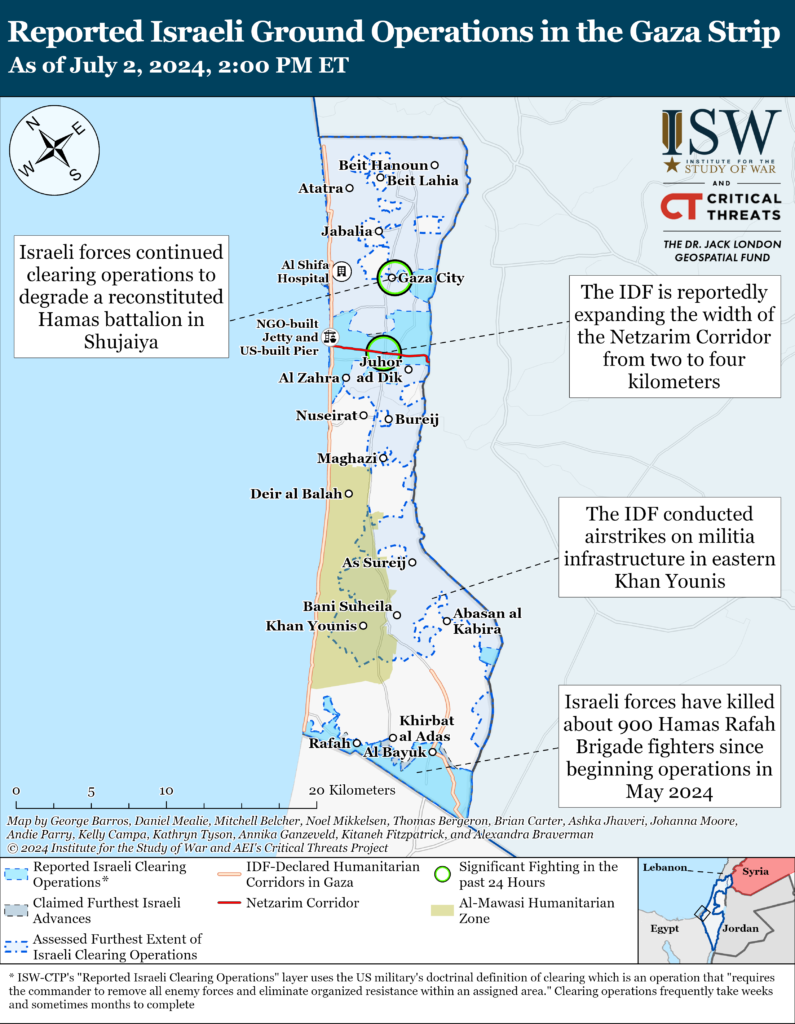
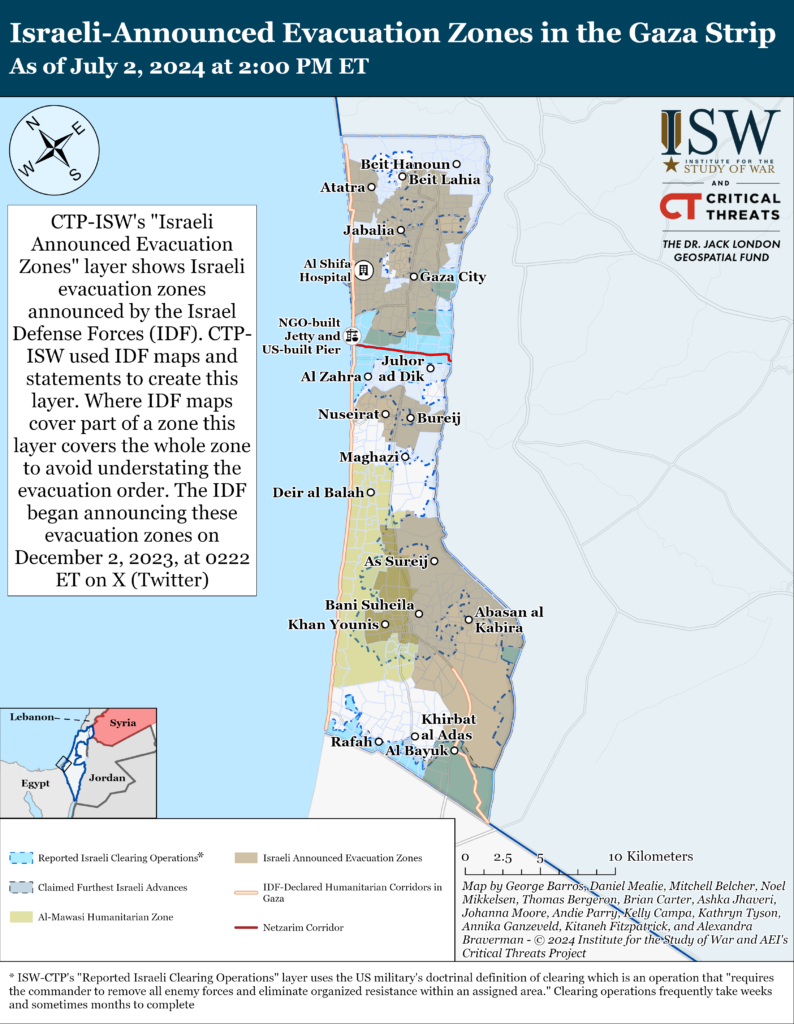
A Gazan electrical company began repairs on electrical infrastructure that supports a desalination plant on July 2.[lxvii] Israeli media reported that the desalination plant would provide water to Deir al Balah and al Mawasi in the central and southern Gaza Strip, respectively. Israeli security officials on July 2 said that repairs to restore electricity to a desalination plant could provide significant amounts of water to humanitarian areas in the Gaza Strip. The officials added that preventing a humanitarian crisis is essential for continuing IDF operations against Hamas in the Gaza Strip.[lxviii]
Palestinian fighters did not conduct indirect fire attacks from the Gaza Strip into Israel on July 2.
West Bank
Axis of Resistance objectives:
Establish the West Bank as a viable front against Israel
Israeli forces have engaged Palestinian fighters in at least six locations since CTP-ISW’s last data cut-off on July 1.[lxix] Israeli forces detained 15 wanted persons and seized small arms during overnight raids in the West Bank.[lxx] The IDF destroyed two lathes and materials in Balata refugee camp used by Palestinian militias to produce weapons.[lxxi] Al Aqsa Martyrs’ Brigades fired small arms and detonated improvised explosive devices targeting Israeli forces conducting a raid in Balata Refugee Camp.[lxxii]
An unidentified Palestinian sniper shot and injured an Israeli civilian in Har Bracha, West Bank.[lxxiii] Israeli forces launched a search in the surrounding area for the suspect.[lxxiv] The IDF received a report of a second shooting targeting the Mitzpe Yosef outpost.[lxxv] The second shooting also injured an Israeli civilian.[lxxvi]
Israeli media reported that unspecified Palestinian fighters detonated an IED during an Israeli raid in Tulkarm on July 1, killing one IDF soldier and injuring a second.[lxxvii] Israeli forces believed the area was cleared of IEDs and exited their Panther armored personnel carrier (APC) to clear the area on foot. The APC was disabled in the blast and towed out of Nour Shams refugee camp. Palestinian militias have previously used sophisticated IEDs to attack Israeli forces in the northern West Bank. PIJ detonated deep-buried improvised explosive devices (IED) targeting two Israeli vehicles around Jenin in the West Bank on June 27, killing one Israeli soldier and wounding 16 others. [lxxviii]
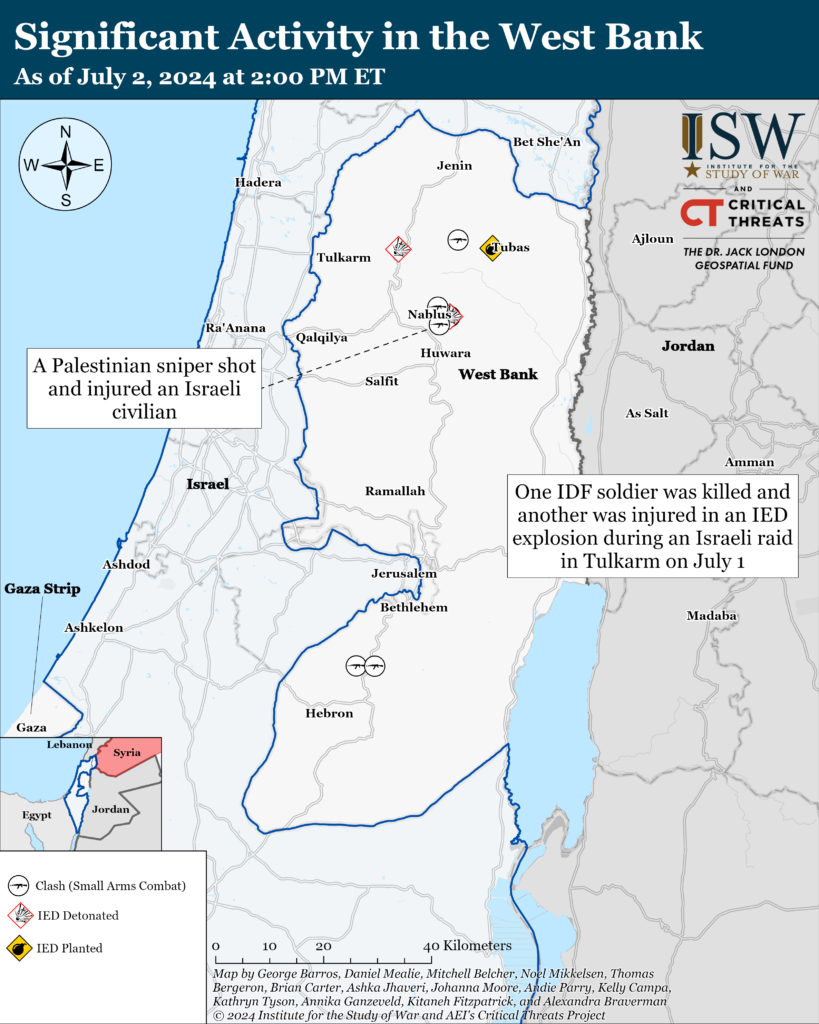
This map is not an exhaustive depiction of clashes and demonstrations in the West Bank.
Southern Lebanon and Golan Heights
Axis of Resistance objectives:
Deter Israel from conducting a ground operation into Lebanon
Prepare for an expanded and protracted conflict with Israel in the near term
Expel the United States from Syria
Iranian-backed militias, including Lebanese Hezbollah, conducted at least three attacks into northern Israel on July 2.[lxxix] Hezbollah fired approximately 15 rockets targeting Israeli forces in Kiryat Shmona.[lxxx] The IDF intercepted 10 rockets and the remaining five rockets fell in open areas.[lxxxi]
The IDF completed military exercises on July 2 simulating a potential offensive in Lebanon.[lxxxii] The 810th Mountain Fields Brigade (210th Division) participated in the exercises over the past week, which simulated urban and mountainous combat.[lxxxiii] The IDF established the brigade in March 2024 as part of the IDF’s stated effort to adapt to the ”changing reality on the Syria-Lebanon border.”[lxxxiv] The brigade is responsible for defending the Mt. Hermon and Mt. Dov areas in northern Israel.[lxxxv]
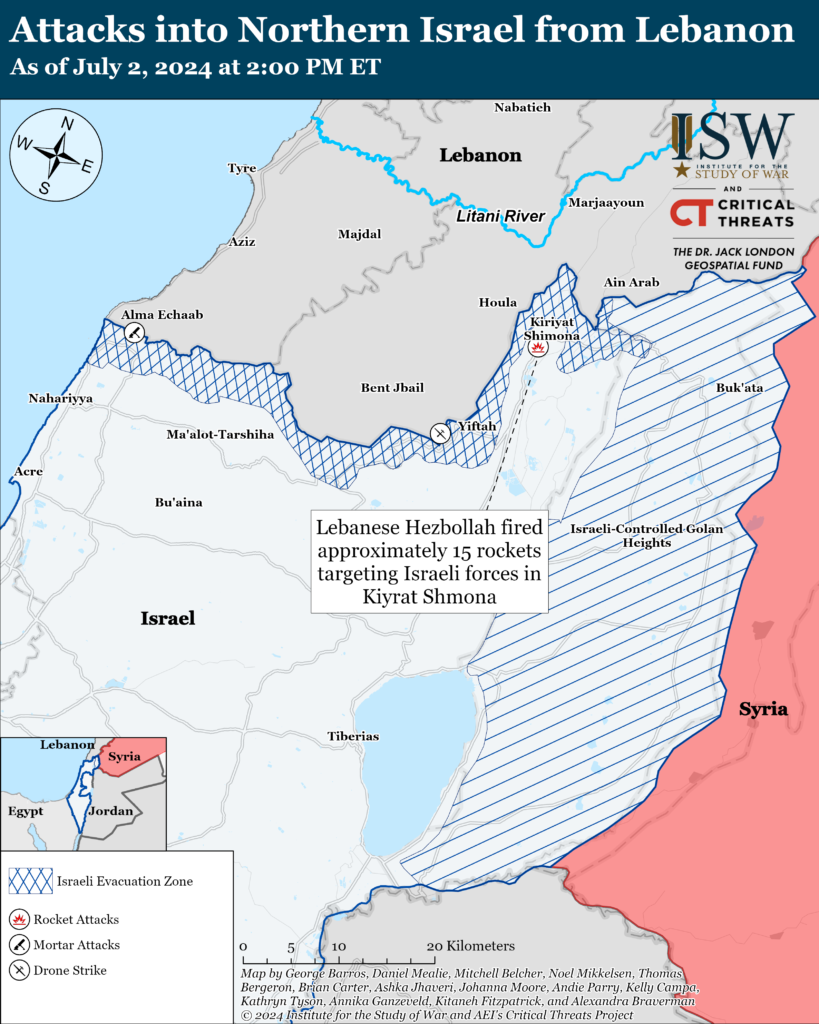
Recorded reports of attacks; CTP-ISW cannot independently verify impact.
Iran and Axis of Resistance
Interim Iranian President Mohammad Mokhber met with the new Chinese Ambassador to Iran Zhong Pei Wu in Tehran on July 2.[lxxxvi] Mokhber stressed the need to implement the 25-year China-Iran strategic cooperation agreement and praised Sino-Iranian relations.[lxxxvii]
The Houthis claimed on July 1 that it conducted four ballistic and cruise missile attacks targeting four commercial vessels in the Red Sea, Mediterranean Sea, Arabian Sea, and Indian Ocean.[lxxxviii] The Houthi movement claimed that it targeted the Liberia-flagged container ship MSC Unific, the Liberia-flagged tanker Delonix, the United Kingdom-flagged cargo ship Anvil Point, and the Malta-flagged tanker Lucky Sailor. The Houthis previously claimed an attack on the Delonix on June 28.[lxxxix] The Houthis said that the vessels belong to the United States, United Kingdom, and Israel. CTP-ISW cannot verify that the attacks occurred at the time of writing.
US CENTCOM reported on July 1 that it destroyed one Houthi radar site in Yemen.[xc] CENTCOM stated that the radar site presented a threat to US, coalition, and merchant vessels in the region.
 Eurasia Press & News
Eurasia Press & News
